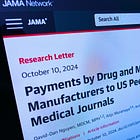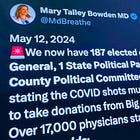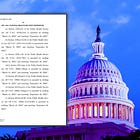Senators Sanders, King Introduce Bill to Ban Prescription Drug Ads: 'End Prescription Drug Ads Now Act'
"The American people are sick and tired of greedy pharmaceutical companies," the Independent senators say.
A new bill introduced in the U.S. Senate by Senators Bernie Sanders (I-VT) and Angus King (I-ME) would outlaw all direct-to-consumer prescription drug advertising—including on TV, radio, print, digital, and social media.
President Donald J. Trump has signed a comprehensive executive order aimed at drastically reducing prescription drug prices in the United States by aligning them with the lowest prices paid in other developed countries.
Both actions confront pharmaceutical industry practices that drive skyrocketing drug prices in the U.S.
Named the “End Prescription Drug Ads Now Act,” the new legislation would amend federal law to prohibit any drug manufacturer from promoting their prescription products to consumers through mass media.
As stated in the bill, this includes “any promotional communication targeting consumers, including through television, radio, print media, digital platforms, and social media, for purposes of marketing such a drug.”
The measure was introduced with support from Democratic Sens. Chris Murphy (CT), Peter Welch (VT), Jeff Merkley (OR), and Dick Durbin (IL).
Follow us on Instagram @realjonfleetwood & Twitter/X @JonMFleetwood.
If you value this reporting, consider upgrading to a paid subscription.
For advertising & sponsorship opportunities reaching 230,000+ monthly viewers, contact us by clicking below.
‘An International Embarrassment’
“The American people are sick and tired of greedy pharmaceutical companies spending billions of dollars on absurd TV commercials pushing their outrageously expensive prescription drugs,” said Sanders in a press release.
“With the exception of New Zealand, the United States is the only country in the world where it is legal for pharmaceutical companies to advertise their drugs on television. It is time for us to end that international embarrassment.”
Sanders emphasized that Americans “don’t want to see misleading and deceptive prescription drug ads on television. They want us to take on the greed of the pharmaceutical industry and ban these bogus ads.”
King echoed the concern, noting, “The widespread use of direct-to-consumer advertising by pharmaceutical companies drives up costs and doesn’t necessarily make patients healthier.”
He added, “This bill is a great step to ensure that patients are getting the best information possible and from the right source: their providers and not biased advertisements.”
Bobby Kennedy’s Name Surfaces
In a notable twist, the legislation also aligns with the long-standing public position of Health and Human Services Secretary Robert F. Kennedy Jr., who, according to the press release, has “repeatedly called to end prescription drug advertising”—a position he promoted during the 2024 presidential race while campaigning for now-President Donald Trump.
Bill Language: Ban Within 30 Days
The bill directly amends Section 502 of the Federal Food, Drug, and Cosmetic Act (21 U.S.C. 352), specifying that any prescription drug will be considered “misbranded” if the manufacturer has conducted any direct-to-consumer advertising within the prior 30 days.
The change would take effect “30 days after the date of enactment of this Act,” applying to any approved or licensed drug regardless of when it first hit the market.
$100 Billion in Profits, $5 Billion in Ads
The push to ban ads comes amid mounting public outrage over Big Pharma profits and manipulative marketing tactics.
Last year, “the 10 largest drug companies made more than $100 billion in profits,” while the pharmaceutical industry “spent over $5 billion on television ads.”
Prescription drug commercials now occupy “more than 30% of commercial time on major networks’ evening news programs,” with $725 million spent in just the first three months of 2025 “advertising just 10 drugs.”
History of Deception
The press release outlines a history of high-profile, high-dollar examples of advertising abuse:
In 2010, Eli Lilly spent $205 million marketing the antidepressant Cymbalta and made $3.2 billion in sales—despite FDA findings that the ads made “unsupported and misleading claims of effectiveness and minimized its safety risks.”
Merck spent $300 million advertising the painkiller Vioxx and made $2.5 billion in sales—before the drug was pulled for causing heart attacks and strokes. Dr. David Graham, an FDA senior official, testified that Merck’s refusal to stop selling Vioxx caused “as many as 55,000 unnecessary deaths.”
And while the ads flood American airwaves, patients in the U.S. continue to pay the highest drug prices in the world, with 1 in 4 Americans unable to afford their prescriptions.
For example, in 2023:
Novo Nordisk spent $263 million advertising Wegovy and $208 million advertising Ozempic.
Americans now pay nearly $1,000 per month for Ozempic—compared to $59 in Germany, $71 in France, $122 in Denmark, and $155 in Canada.
Wegovy, aimed at obesity, costs $1,349 per month in the U.S., while the same product is sold for $92 in the U.K., $137 in Germany, and $265 in Canada.
A Long Time Coming
Banning these ads “is not a radical idea,” according to Sanders.
The American Medical Association endorsed the ban more than ten years ago.
Studies cited in the release indicate that over half of all prescription drug ads are either misleading or false, and Harvard researchers have shown that the most heavily advertised drugs often offer “little to no therapeutic benefit” compared to cheaper alternatives.
Seniors are especially vulnerable.
“Pharmaceutical companies strategically target them by pushing high-priced medications that may cause them harm,” the release warns.
If passed, this bill would mark a seismic shift in how drugs are marketed in the U.S.—and would deliver a major blow to the pharmaceutical lobby’s influence on American media and public health.
Follow us on Instagram @realjonfleetwood & Twitter/X @JonMFleetwood.
If you value this reporting, consider upgrading to a paid subscription.
For advertising & sponsorship opportunities reaching 230,000+ monthly viewers, contact us by clicking below.












But what Sanders and King FAILED to mention is the fact that drug advertising is not intended to get customers.
It's just a bribe to the corrupt media to _not_ talk about inconvenient facts like the millions of deaths caused by Pfizer's dangerous and defective mRNA jabs.
If the media says a peep about those murders, then Pfizer will cut off the "advertising" money and that TV station or newspaper will suffer.
Pfizer doesn't care at all if anyone sees their "ads". What they care about is making sure that no one sees news about the deaths and maimings caused by their products.
One of the very rare times I have to support something Sanders is behind.